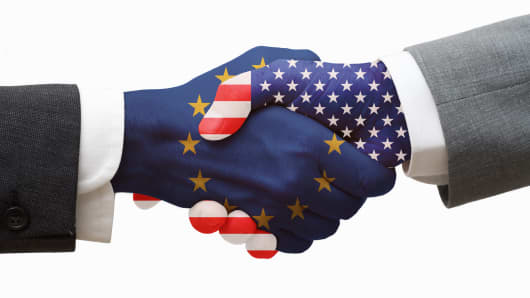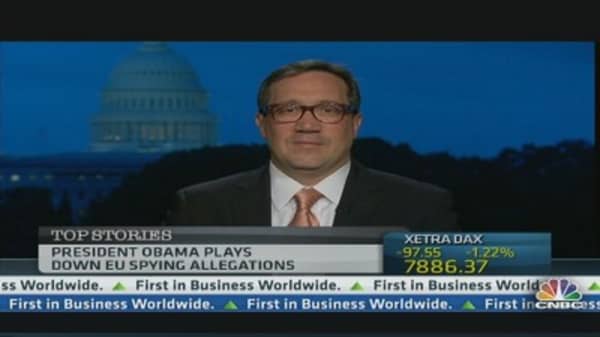U.K. Prime Minister David Cameron has billed it as potentially the "biggest bilateral trade deal in history", but the U.S.-EU trade talks have suddenly entered tricky waters.
Recent claims that the U.S. National Security Agency (NSA) bugged EU offices and hacked into its computer network have complicated the first round of negotiations over the Transatlantic Trade & Investment Partnership (TTIP), which is set to get underway on Monday. France called for discussions to be halted for two weeks, but many in the EU feel that a compromise should be reached due to the economic benefits the deal can bring to the 28 member bloc.
The EU and US account for nearly half the world's gross domestic product (GDP), and both sides are hoping the deal will create a massive trading bloc able to compete with China.
Elmar Brok, a German member of European Parliament (MEP) said that while there is a "lack of confidence" after the spying allegations, "the deal is of common interest and we should overcome these problems to find a win-win situation for both sides."
(Read More: US Spying a 'Slap in the Face': EU Lawmaker)
According to the Centre for Economic Policy Research (CEPR), a U.S.-EU free trade agreement could boost the U.S. economy by an estimated 95 billion euros ($123 billion) a year and the EU economy by around 119 billion euros ($154 billion). It could also increase GDP in the rest of the world by almost 100 billion euros ($129 billion).
Under a deal, the U.S. and EU would get greater access to each other's markets by removing tariffs, opening up the services sector, and improving investment with the aim of kick-starting growth.
"A deal will open up the agricultural markets and certain elements of public services across the Atlantic, which could add a significant amount of jobs across the EU. And given that we have such a sluggish economy at the moment, even half a per cent of growth will be massive," David Martin, a Scottish MEP on the international trade committee of the European Parliament, told CNBC.
(Read More: Brussels Threatens to Suspend Data Sharing with US in Spying Row)




